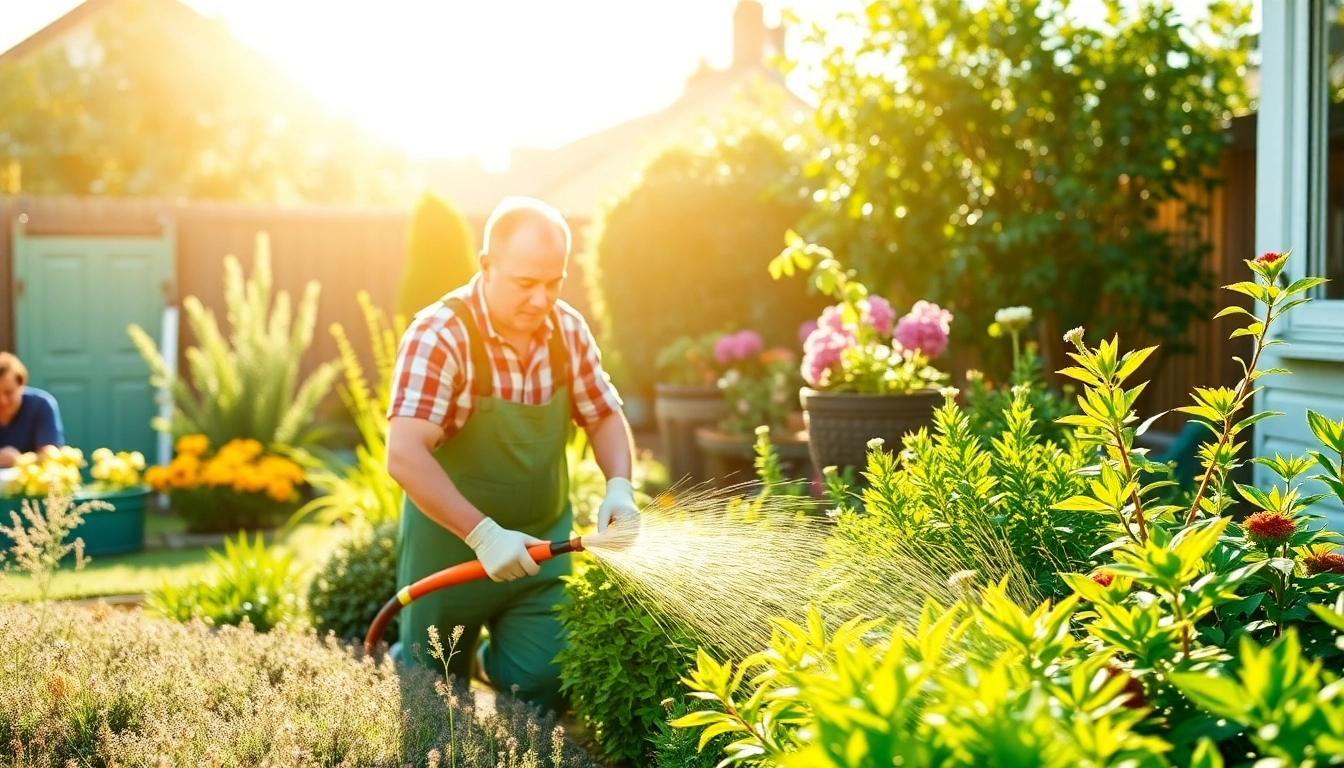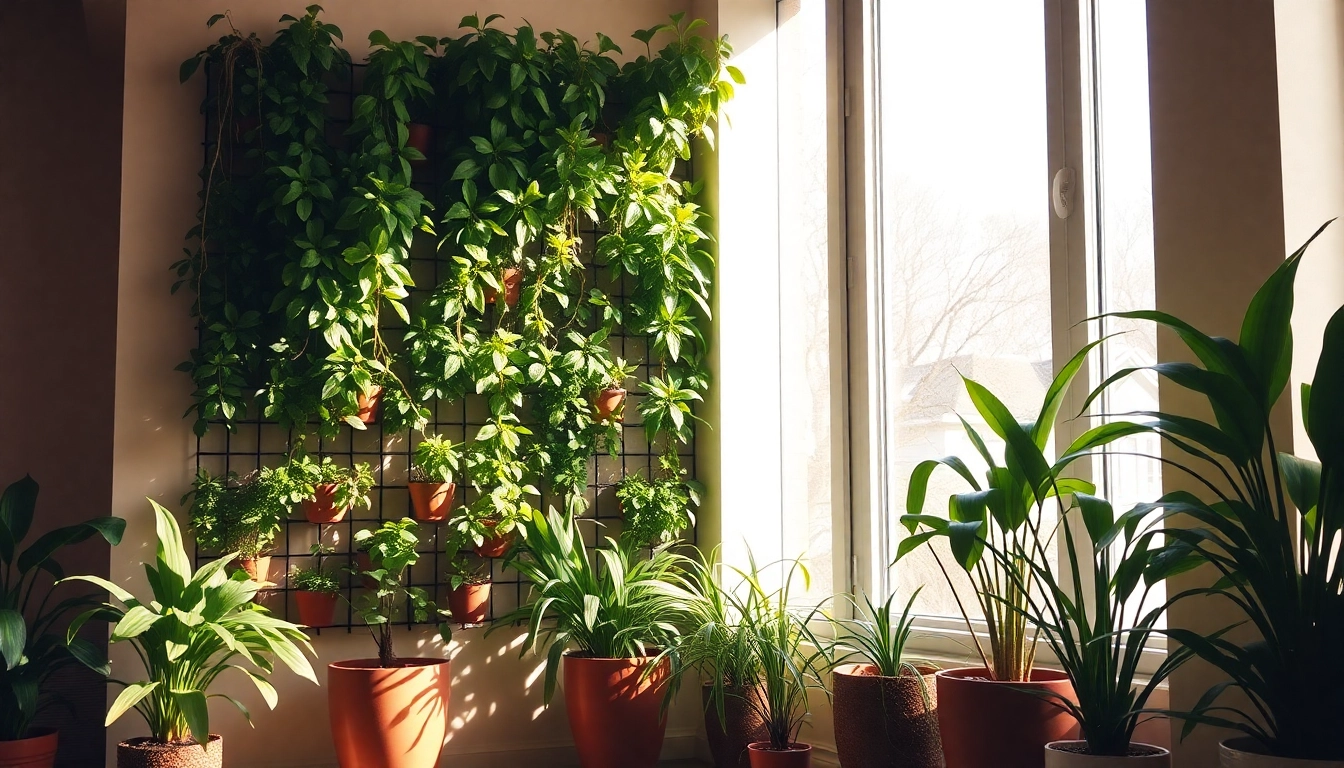Understanding Garden Maintenance Services
What Is Garden Maintenance?
Garden maintenance encompasses a range of regular tasks and services that promote the health and aesthetics of outdoor spaces. It includes everything from mowing lawns and pruning shrubs to weeding, planting, and pest control. Professionals in this field have the expertise to ensure that gardens not only look appealing but also thrive throughout the seasons. Regular maintenance can significantly contribute to the overall longevity of plants and garden features, creating a vibrant and enjoyable atmosphere.
Key Benefits of Regular Maintenance
Engaging a garden maintenance service offers several benefits:
- Enhanced Aesthetics: Regular upkeep ensures that your garden looks its best, which can enhance curb appeal and property value.
- Soil Health: Consistent maintenance practices contribute to soil quality, helping plants receive essential nutrients.
- Pest Prevention: A well-maintained garden is less likely to attract pests, reducing the need for chemical interventions later.
- Seasonal Preparedness: Ongoing maintenance helps gardens acclimate to seasonal changes, promoting long-term sustainability.
- Time-Saving: Hiring professionals allows homeowners to save time, letting them focus on enjoying their outdoor space instead of managing it.
Common Services Offered
Garden maintenance services typically include:
- Lawn Care: Mowing, aerating, fertilizing, and overseeding for a lush green lawn.
- Pruning and Trimming: Shaping shrubs and trees to promote growth and remove dead or diseased branches.
- Weeding: Regular removal of weeds to prevent competition for resources.
- Planting: Introducing new plants, flowers, and shrubs for color and diversity.
- Pest and Disease Management: Identifying and treating infestations or diseases that could harm plants.
Choosing the Right Garden Maintenance Service
Factors to Consider
Choosing the right garden maintenance service involves several key factors:
- Experience: Look for companies with a proven track record and years of experience in the industry.
- Services Offered: Ensure the company provides a full range of services that meet your specific needs.
- Reputation: Research reviews and check references to gauge customer satisfaction and reliability.
- Certifications: Verify any credentials or certifications that demonstrate expertise.
- Insurance: Confirm that the service provider carries liability insurance to protect you and your property.
How to Evaluate Service Providers
Evaluating potential garden maintenance service providers requires thorough consideration:
- Request Quotes: Obtain detailed quotes from multiple providers to compare pricing structures and service details.
- Ask About Techniques: Inquire about the methods and products they use to ensure they align with your preferences, especially related to pesticides and fertilizers.
- Check Availability: Ensure that they can schedule regular maintenance at times that work best for you.
- Consult Portfolio: Review their previous work or case studies to assess quality and range.
- Trial Services: Consider engaging them for a trial service to evaluate their expertise and attention to detail.
Cost Considerations and Value
Understanding the cost structure of garden maintenance services can help you make informed decisions:
- One-Time vs. Regular Services: Determine if you prefer a one-time service for specific tasks or ongoing regular services.
- Pricing Models: Familiarize yourself with how services are priced. Common models include hourly rates, flat fees for specific tasks, or subscription models for ongoing care.
- Hidden Costs: Ask about potential extra charges for materials, transporting equipment, or additional work beyond the basics.
- Value Proposition: Evaluate how much value each service provides by considering their quality, reliability, and effectiveness in maintaining your garden.
Common Challenges in Garden Maintenance
Pest Control and Management
Pest management is often one of the most pressing challenges in garden maintenance. Identifying pests early is crucial, as it can save plants and preserve the integrity of your garden. Integrated Pest Management (IPM) strategies can be effective and eco-friendly, incorporating biological control methods, mechanical traps, and organic pesticides.
Seasonal Changes and Their Impact
Different seasons bring varied challenges to garden maintenance. For instance, spring requires planting and fertilization, while autumn focuses on preparation for colder temperatures. Understanding seasonal cycles is key to knowing when to plant, pruned, water, and protect your garden against frost or heat. Adapting maintenance practices to these changes ensures that your garden remains resilient year-round.
Sustainability and Eco-Friendly Practices
More garden maintenance services are incorporating sustainable practices to minimize environmental impact. Composting, organic fertilizers, and water-efficient irrigation systems are among the strategies being employed. Opting for native plants can also contribute to a more sustainable garden, as they are better adapted to local conditions and require less maintenance.
Best Practices for Maintaining Your Garden
Essential Tools and Equipment
Utilizing the right tools is fundamental for effective garden maintenance. Essential tools include:
- Pruners: For trimming plants and removing dead branches.
- Loppers: Essential for cutting thicker branches.
- Trowels: Perfect for planting and transplanting small plants.
- Lawn Mowers: Necessary for maintaining grass height.
- Weeders: Help keep the garden bed clean and free of invasive weeds.
- Hand Rakes: Useful for collecting debris and preparing soil.
Scheduling Regular Maintenance Tasks
Establishing a maintenance schedule can prevent tasks from piling up and ensures a garden stays healthy. Regularly scheduled activities might include:
- Weekly lawn mowing during growth periods.
- Monthly insect and pest checks throughout the warm months.
- Seasonal planting and soil enrichment activities.
- Annual comprehensive pruning of shrubs and trees.
DIY Tips Complementing Professional Services
While professional services can take on heavy lifting, homeowners can engage in several DIY practices to complement ongoing maintenance:
- Regular Inspections: Conduct weekly checks for pests or diseases, noting any changes in your plants’ health.
- Mulching: Apply mulch around plants to minimize weeds and retain moisture.
- Watering Wisely: Test soil moisture before watering and apply deep rather than frequent watering.
- Engagement: Spend time in your garden to understand the needs of your plants and learn about their growth cycles.
Measuring Success in Your Garden Maintenance
Key Performance Indicators (KPIs)
To assess the effectiveness of garden maintenance, it’s essential to measure specific KPIs, such as:
- Plant Health: Monitoring growth rates, color vibrancy, and pest resistance can indicate overall garden health.
- Weed Pressure: A decrease in the number of weeds over time reflects good maintenance.
- Soil Quality: Regular testing of soil can reveal nutrient levels and overall fertility.
- Visitor Satisfaction: Feedback from family, friends, or neighbors can provide insights into garden appearance and enjoyment.
Adjusting Your Strategy Based on Results
Regular evaluation allows you to tweak maintenance strategies as necessary. If certain plants struggle, perhaps switching to species that are naturally more resilient to local conditions is warranted. Similarly, if pests become a recurring issue, it might be time to review and adjust pest management tactics.
Long-Term Planning for Garden Health
Long-term success in garden maintenance relies on planning and foresight. Incorporating diverse plantings, rotating crops, and setting up an irrigation schedule that accounts for changing weather patterns can elevate garden health. Engaging with experts periodically for a “health check” or adopting new technologies such as soil sensors can further contribute to forward-thinking maintenance approaches.


